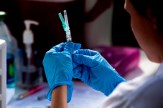Northeastern Postdoctoral Student Earns a Top Prize at Controlled Release Society Meeting in New York
Boston – July 24, 2008 – Aristarchos Papagiannaros, Ph.D., postdoctoral student at the Center for Pharmaceutical Biotechnology and Nanomedicine at Northeastern University’s Bouvé College of Health Sciences, received an award during the Controlled Release Society’s annual meeting in New York. Out of more than 700 entries in the Highlights of Student Posters competition, Papagiannaros and his colleagues were one of 10 teams chosen to give a presentation about their poster for which they received third prize and a $1,000 cash award.
The poster, entitled “In vivo whole body imaging with a new lipid core micelle-based near infrared imaging agent,” details the method of tumor detection using infrared imaging that they are exploring in the lab. Using mice, the research team is looking to develop effective non-invasive near infrared imaging techniques that will show, in vivo, where a tumor is located in the body.
Papagiannaros and his colleagues set out to create a contrast agent that would effectively target tumor cells with a high degree of precision. Using quantum dots, fluorescent nanocrystals made of semiconductor materials, and enveloping them with biocompatible lipids, they created quantum dot micellular contrast agents. When this agent is injected into a mouse, it gives off a fluorescence that indicates where the tumor is in the body.
The contrast agent led to the fast identification and quantification of the tumor volume, taking less than an hour with half the dosage of current contrast agents available commercially. In addition, the contrast agent accumulation at the site of the tumor was 2.5 times higher at hone hour that the commercial form.
They also modified the contrast agent with anticancer antibodies, which actively target cancer cells. The antibody, 2C5, detects the presence of the nucleosomes of cancer cells, an integral part of cell replication, and helps to suppress tumor growth. The antibody-modified quantum dot micelles that accumulated at the area where the tumor was growing was 5x more than current non-anticancer antibody targeted agents.
“This simple yet novel research model has the potential for applications across different forms of cancer,” said Papagiannaros, who has been studying at Northeastern for a year and a half. “Using agents that could identify cancer cell clusters early in the process, when they are normally too small to be detected, could have enormous implications.”
For more information about this research, please contact Jenny Eriksen at j.eriksen@neu.edu or via phone at (6107) 373-2802.
About Northeastern
Founded in 1898, Northeastern University is a private research university located in the heart of Boston. Northeastern is a leader in interdisciplinary research, urban engagement, and the integration of classroom learning with real-world experience. The university’s distinctive cooperative education program, where students alternate semesters of full-time study with semesters of paid work in fields relevant to their professional interests and major, is one of the largest and most innovative in the world.The University offers a comprehensive range of undergraduate and graduate programs leading to degrees through the doctorate in six undergraduate colleges, eight graduate schools, and two part-time divisions.For more information, please visit www.northeastern.edu.





